外研版八年级上册Module 1 How to learn English Unit 1 Let's try to speak English as much as possible. 课件(共26张
文档属性
| 名称 | 外研版八年级上册Module 1 How to learn English Unit 1 Let's try to speak English as much as possible. 课件(共26张 | 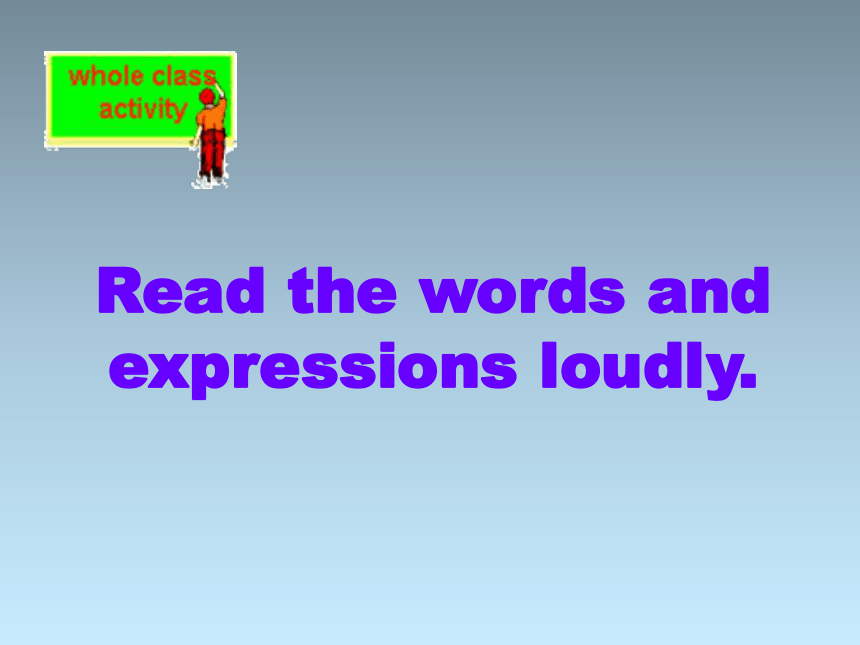 | |
| 格式 | pptx | ||
| 文件大小 | 1.3MB | ||
| 资源类型 | 教案 | ||
| 版本资源 | 外研版 | ||
| 科目 | 英语 | ||
| 更新时间 | 2022-06-23 16:42:22 | ||
图片预览

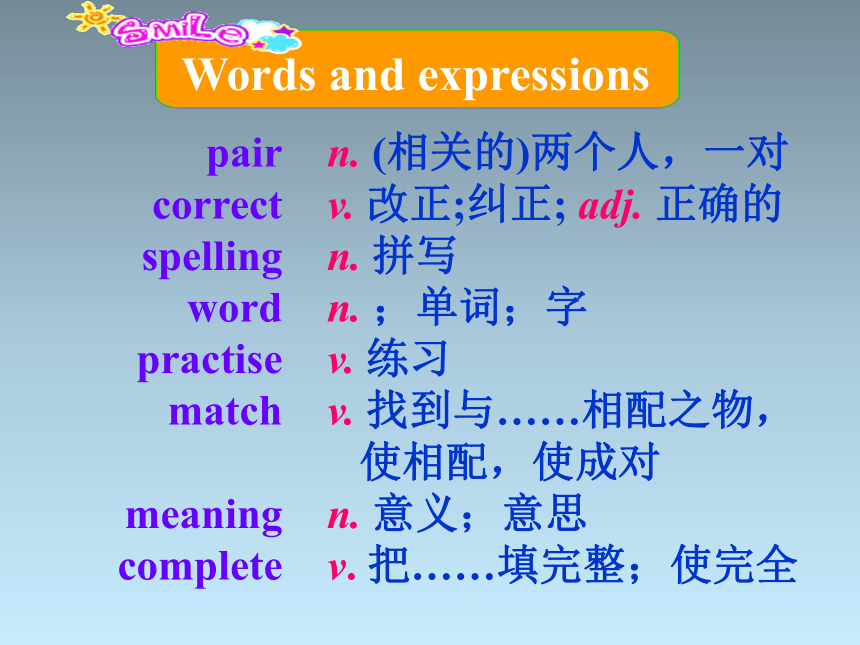
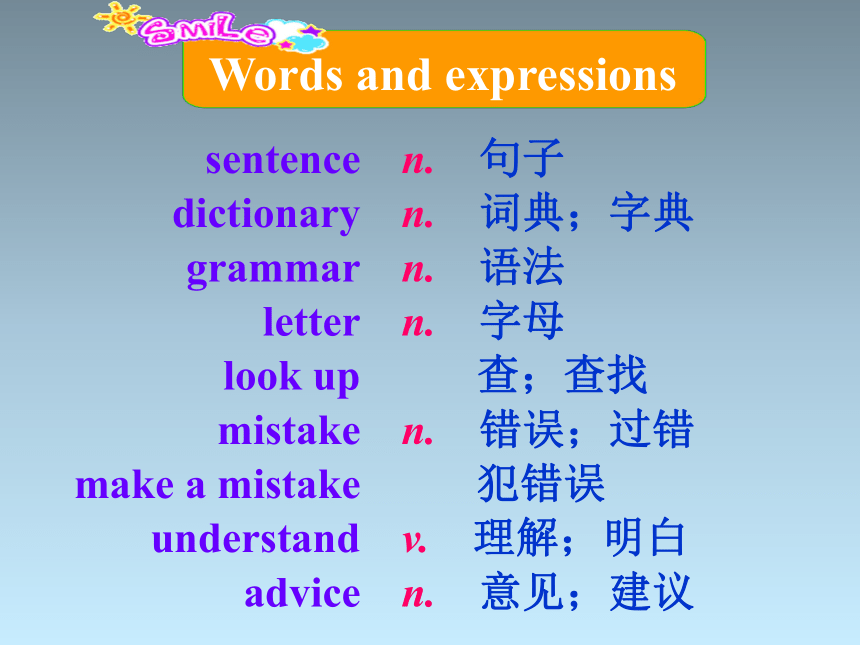
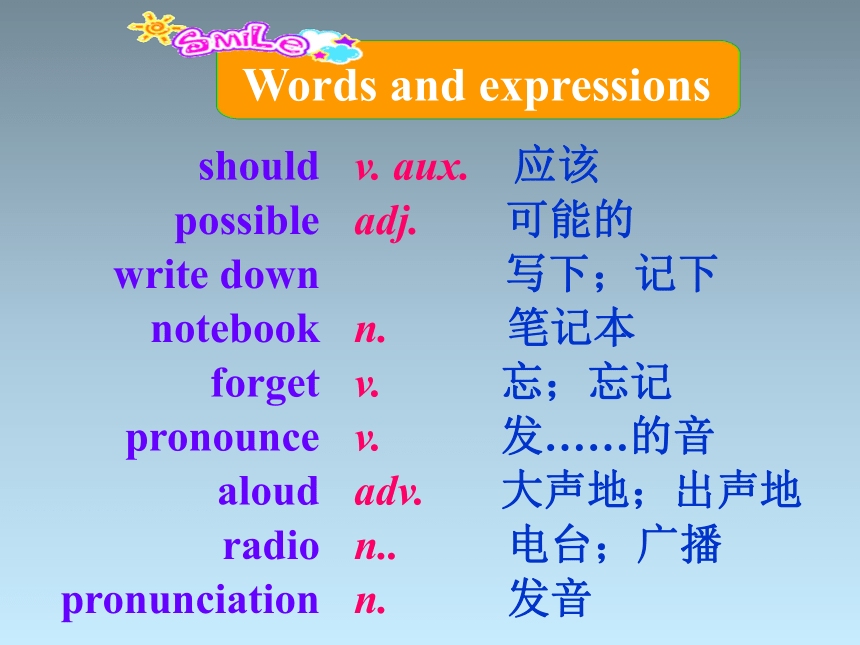
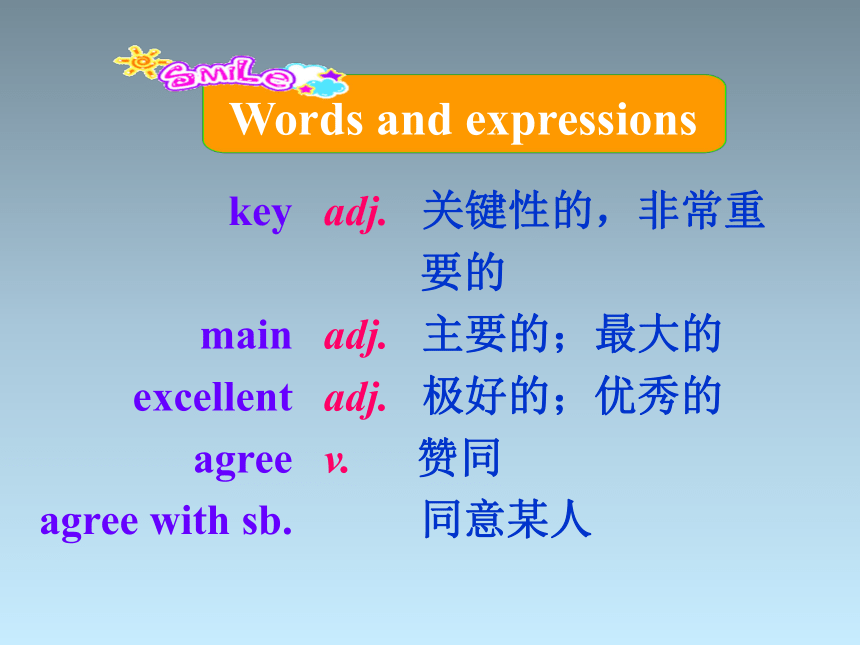
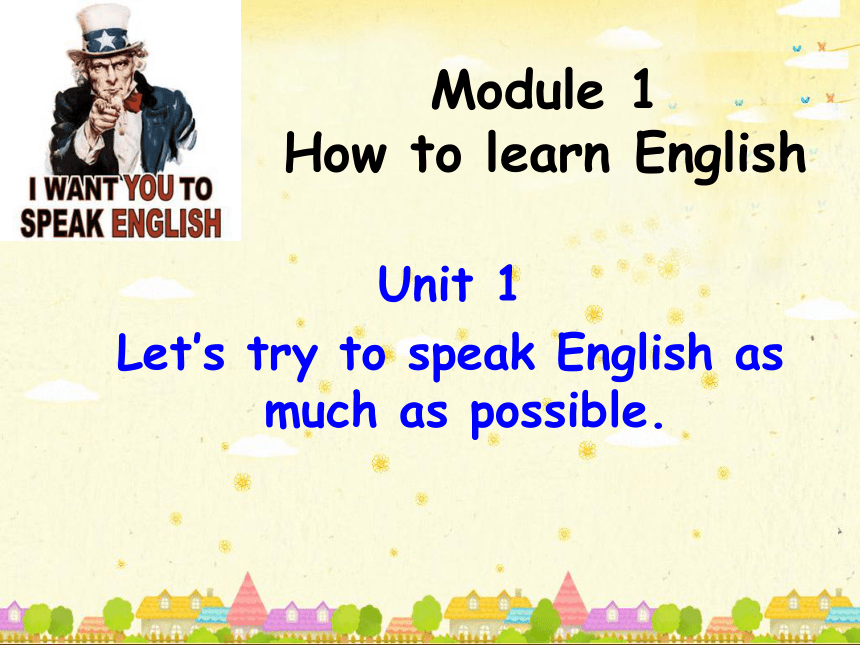



文档简介
(共26张PPT)
Read the words and expressions loudly.
pair
correct
spelling
word
practise
match
meaning
complete
n. (相关的)两个人,一对
v. 改正;纠正; adj. 正确的
n. 拼写
n. ;单词;字
v. 练习
v. 找到与……相配之物,使相配,使成对
n. 意义;意思
v. 把……填完整;使完全
Words and expressions
sentence
dictionary
grammar
letter
look up
mistake
make a mistake
understand
advice
n. 句子
n. 词典;字典
n. 语法
n. 字母
查;查找
n. 错误;过错
犯错误
v. 理解;明白
n. 意见;建议
Words and expressions
should
possible
write down
notebook
forget
pronounce
aloud
radio
pronunciation
v. aux. 应该
adj. 可能的
写下;记下
n. 笔记本
v. 忘;忘记
v. 发……的音
adv. 大声地;出声地
n.. 电台;广播
n. 发音
Words and expressions
Words and expressions
key
main
excellent
agree
agree with sb.
adj. 关键性的,非常重
要的
adj. 主要的;最大的
adj. 极好的;优秀的
v. 赞同
同意某人
Module 1
How to learn English
Unit 1
Let’s try to speak English as much as possible.
newspaper
magazine
Internet
报纸
杂志
互联网
Where can we see English
in our daily life
China Radio International
Voice of America
CRI
A lot of things around us are used in English.
美国之音
and so on…
Do you want to learn English well
English is very important and useful.
Do you like English
Read the instructions and check (√) the ones you understand.
Work in pairs. Ask and answer the questions.
2. Correct the spelling.
3. Listen and check the words you hear.
4. Practise saying the words.
5. Match the words with their meaning.
6. Complete the sentences with the words in the box.
A1
A. dictionary ( ) B. make a mistake ( )
C. understand ( ) D. grammar ( )
E. look up ( ) F. letter ( )
1
2
3
4
5
6
Listen and number.
Listening A2
1.Which word did Daming not understand
2.What mistake did Lingling make
3.How does Daming usually check the spelling
of a word
4.Why was it difficult for Daming to check the spelling of a word
Spring
Yesterday, I “go” to the cinema.
By looking up the dictionary.
looking it up in the dictionary
Because he didn’t know the first letter.
Listen and answer the questions.
Listening A2
Yesterday, I “went” to the cinema.
Listen and choose the best answers.
( )1. Where are they talking
A. In the classroom.
A
( ) 2. What are they talking about
how to get on well with their classmates.
how to speak English.
C. how to learn English.
C
B. At home.
C. In the park.
Listening A3
Listen it again and then check
if the following statements are T or F.
Listening A3
( )4. Listen to English radio program.
( )5. Read English stories.
( )6. Try to understand every word.
( )1. Speak Chinese in class.
( ) 2. Write the mistakes in the notebooks.
( )3. Write down the correct answers
next to the mistakes.
F
T
T
T
T
F
Don’t need to understand every word.
English
Ms James: Welcome back, everyone!
Today,we are going to talk about good to learn English. Ready Who has some
Lingling: We should always English
in class.
Ms James: Good! Let’s speak English as much as possible.
Daming:Why not write down the in our notebooks
Ms James: That’s a good idea.And don’t forget to write down the answers next to
the mistakes What else
ways
advice
speak
try to
mistakes
correct
Listening A3
Listen and fill in the blanks.
Lingling: It’s a good idea and pronounce new words every day.
Ms James: Thanks a lot, Lingling. How about the radio
Daming:Yes, that’s good for our
too. But there are so many new words.
Ms James: You don’t need to every word. You just need to listen for words and ideas.
to spell
aloud
listening to
pronunciation
understand
key
main
Daming: That’s the same for reading.English stories are so interesting . I get to know a lot about the world through .
Lingling: I think is also important .
Why don’t we try to find some English pen friends We can write to them.
Ms James:Excellent! I with you.
reading
agree
writing
Read aloud
Reading
Crazy Show!
Read the dialogue in roles, and underline the expressions of suggestion, then show your achievement.
Please pay attention to the intonation.
How/What about …
Would you like …
Let’s …
Why don’t you…
Why not…
You should/shouldn't …
It's a good idea to do.....
doing sth.
to do sth.
do sth.
常用的回答是:
That’s a good/great idea.
OK./ All right.
How many pieces of advice
can you find
Listening: listen to the radio
Speaking:
Reading:
Wrting:
Learning new words:
Write notes about learning English.
speak English as much as possible;
read English stories,
write to English pen friends
spell and
pronounce new words aloud every day
listen to the radio; always speak in English in class
understand key words and main ideas
Reading
Work in pairs. Talk about problems in learning English and give advice.
Problems Advice
I can’t… I don’t know… How/ What about…
Why don’t you/ not…?
Speaking
Example:
I can’t speak English well. What should I do
Why don’t you try to talk to our classmates in English
Now it’s your turn!
What’s the of being a good English learner
secret
Culture:
To attract the students’ interest in learning English.
Summary
Key structures:
How/What about …
Let’s …
Why don’t you… /Why not…
We/You should…
It's a good idea to do…
Key words:
pair, correct, spelling, practise,
match, complete, sentence, dictionary, grammar、letter、understand, advice, possible, notebook, forget, pronounce, excellent…
Key phrases:
look up、make a mistake, write down, agree with …
Homework
1. Remember all the new words and expressions we’ve learned today.
2. Give some advice on English learning and write them down.
Read the words and expressions loudly.
pair
correct
spelling
word
practise
match
meaning
complete
n. (相关的)两个人,一对
v. 改正;纠正; adj. 正确的
n. 拼写
n. ;单词;字
v. 练习
v. 找到与……相配之物,使相配,使成对
n. 意义;意思
v. 把……填完整;使完全
Words and expressions
sentence
dictionary
grammar
letter
look up
mistake
make a mistake
understand
advice
n. 句子
n. 词典;字典
n. 语法
n. 字母
查;查找
n. 错误;过错
犯错误
v. 理解;明白
n. 意见;建议
Words and expressions
should
possible
write down
notebook
forget
pronounce
aloud
radio
pronunciation
v. aux. 应该
adj. 可能的
写下;记下
n. 笔记本
v. 忘;忘记
v. 发……的音
adv. 大声地;出声地
n.. 电台;广播
n. 发音
Words and expressions
Words and expressions
key
main
excellent
agree
agree with sb.
adj. 关键性的,非常重
要的
adj. 主要的;最大的
adj. 极好的;优秀的
v. 赞同
同意某人
Module 1
How to learn English
Unit 1
Let’s try to speak English as much as possible.
newspaper
magazine
Internet
报纸
杂志
互联网
Where can we see English
in our daily life
China Radio International
Voice of America
CRI
A lot of things around us are used in English.
美国之音
and so on…
Do you want to learn English well
English is very important and useful.
Do you like English
Read the instructions and check (√) the ones you understand.
Work in pairs. Ask and answer the questions.
2. Correct the spelling.
3. Listen and check the words you hear.
4. Practise saying the words.
5. Match the words with their meaning.
6. Complete the sentences with the words in the box.
A1
A. dictionary ( ) B. make a mistake ( )
C. understand ( ) D. grammar ( )
E. look up ( ) F. letter ( )
1
2
3
4
5
6
Listen and number.
Listening A2
1.Which word did Daming not understand
2.What mistake did Lingling make
3.How does Daming usually check the spelling
of a word
4.Why was it difficult for Daming to check the spelling of a word
Spring
Yesterday, I “go” to the cinema.
By looking up the dictionary.
looking it up in the dictionary
Because he didn’t know the first letter.
Listen and answer the questions.
Listening A2
Yesterday, I “went” to the cinema.
Listen and choose the best answers.
( )1. Where are they talking
A. In the classroom.
A
( ) 2. What are they talking about
how to get on well with their classmates.
how to speak English.
C. how to learn English.
C
B. At home.
C. In the park.
Listening A3
Listen it again and then check
if the following statements are T or F.
Listening A3
( )4. Listen to English radio program.
( )5. Read English stories.
( )6. Try to understand every word.
( )1. Speak Chinese in class.
( ) 2. Write the mistakes in the notebooks.
( )3. Write down the correct answers
next to the mistakes.
F
T
T
T
T
F
Don’t need to understand every word.
English
Ms James: Welcome back, everyone!
Today,we are going to talk about good to learn English. Ready Who has some
Lingling: We should always English
in class.
Ms James: Good! Let’s speak English as much as possible.
Daming:Why not write down the in our notebooks
Ms James: That’s a good idea.And don’t forget to write down the answers next to
the mistakes What else
ways
advice
speak
try to
mistakes
correct
Listening A3
Listen and fill in the blanks.
Lingling: It’s a good idea and pronounce new words every day.
Ms James: Thanks a lot, Lingling. How about the radio
Daming:Yes, that’s good for our
too. But there are so many new words.
Ms James: You don’t need to every word. You just need to listen for words and ideas.
to spell
aloud
listening to
pronunciation
understand
key
main
Daming: That’s the same for reading.English stories are so interesting . I get to know a lot about the world through .
Lingling: I think is also important .
Why don’t we try to find some English pen friends We can write to them.
Ms James:Excellent! I with you.
reading
agree
writing
Read aloud
Reading
Crazy Show!
Read the dialogue in roles, and underline the expressions of suggestion, then show your achievement.
Please pay attention to the intonation.
How/What about …
Would you like …
Let’s …
Why don’t you…
Why not…
You should/shouldn't …
It's a good idea to do.....
doing sth.
to do sth.
do sth.
常用的回答是:
That’s a good/great idea.
OK./ All right.
How many pieces of advice
can you find
Listening: listen to the radio
Speaking:
Reading:
Wrting:
Learning new words:
Write notes about learning English.
speak English as much as possible;
read English stories,
write to English pen friends
spell and
pronounce new words aloud every day
listen to the radio; always speak in English in class
understand key words and main ideas
Reading
Work in pairs. Talk about problems in learning English and give advice.
Problems Advice
I can’t… I don’t know… How/ What about…
Why don’t you/ not…?
Speaking
Example:
I can’t speak English well. What should I do
Why don’t you try to talk to our classmates in English
Now it’s your turn!
What’s the of being a good English learner
secret
Culture:
To attract the students’ interest in learning English.
Summary
Key structures:
How/What about …
Let’s …
Why don’t you… /Why not…
We/You should…
It's a good idea to do…
Key words:
pair, correct, spelling, practise,
match, complete, sentence, dictionary, grammar、letter、understand, advice, possible, notebook, forget, pronounce, excellent…
Key phrases:
look up、make a mistake, write down, agree with …
Homework
1. Remember all the new words and expressions we’ve learned today.
2. Give some advice on English learning and write them down.
同课章节目录
- Module 1 How to learn English
- Unit 1 Let's try to speak English as much as possi
- Unit 2 You should smile at her.
- Unit 3 Language in use .
- Module 2 My home town and my country
- Unit 1 It's taller than many other buildings.
- Unit 2 Cambridge is a beautiful city in the east o
- Unit 3 Language in use .
- Module 3 Sports.
- Unit 1 Nothing is more exciting than playing tenni
- Unit 2 This year we training more carefully.
- Unit 3 Language in use .
- Module 4 Planes, ships and trains .
- Unit 1 He lives the farthest from school.
- Unit 2 What is the best way to travel.
- Unit 3 Language in use .
- Module 5 Lao She Teahouse.
- Unit 1 I wanted to see the Beijing Opera.
- Unit 2 It descibes the changes in Chinese society.
- Unit 3 Language in use .
- Module 6 Animals in danger.
- Unit 1 It allows people to get closer to them .
- Unit 2 The WWF is working hard to save them all.
- Unit 3 Language in use .
- Revision module A
- Module 7 A famous story
- Unit 1 Alice was sitting with her sister by the ri
- Unit 2 She was thinking about her cat.
- Unit 3 Language in use .
- Module 8 Accidents
- Unit 1 While the car were changing to red, a car s
- Unit 2 I was trying to pick it up when it bite me
- Unit 3 Language in use .
- Module 9 Population
- Unit 1 The population of China is about 1.37 billi
- Unit 2 Arnwick was a city with 200,000 people.
- Unit 3 Language in use .
- Module 10 The weathe
- Unit 1 It might snow.
- Unit 2 The weather is fine all year round.
- Unit 3 Language in use .
- Module 11 Way of life
- Unit 1 In China ,we open a gift later.
- Unit 2 In England, you usually drink tea with milk
- Unit 3 Language in use .
- Module 12 Help
- Unit 1 What should we do before help arrives?
- Unit 2 Stay away from windows and heavy furniture.
- Unit 3 Language in use .
- Revision module B
